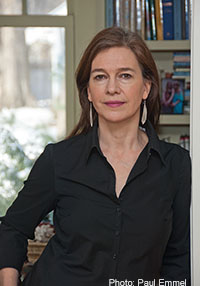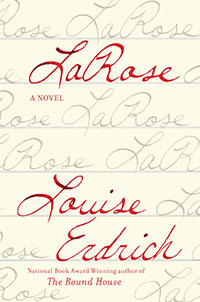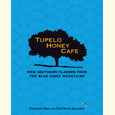Unspeakable Gift
In Louise Erdrich’s latest novel, LaRose, grief unfolds in a multi-generational tale of justice and atonement
In the mesmerizing opening pages of Louise Erdrich’s new novel, LaRose, two neighboring households straddling the border of Ojibwe reservation land become permanently entangled in matters of justice and grief after the accidental shooting death of Peter and Nola’s young son, Dusty. Next door, during the upheaval of their guilt, Landreaux and Emmaline reach a wrenching decision: they’ll seek “an old form of justice,” offering up their youngest son, LaRose, to live with Peter and Nola as their own.
 Landreaux and Emmaline have always suspected that their youngest son has a special path to follow. In separate visions, both parents have seen him involved in a fate which cannot be ignored. That’s why they called him LaRose, the name given to children in their family who become spiritual leaders, medicine men and women. But they gave him a secret name, as well: Mirage. This is the name they make a point to speak aloud before sending him to live with Peter and Nola: “That name would protect him from the unknown, from what had been let loose with the accident. Sometimes energy of this nature, chaos, ill luck, goes out in the world and begets and begets. Bad luck rarely stops with one occurrence. All Indians know that.”
Landreaux and Emmaline have always suspected that their youngest son has a special path to follow. In separate visions, both parents have seen him involved in a fate which cannot be ignored. That’s why they called him LaRose, the name given to children in their family who become spiritual leaders, medicine men and women. But they gave him a secret name, as well: Mirage. This is the name they make a point to speak aloud before sending him to live with Peter and Nola: “That name would protect him from the unknown, from what had been let loose with the accident. Sometimes energy of this nature, chaos, ill luck, goes out in the world and begets and begets. Bad luck rarely stops with one occurrence. All Indians know that.”
When LaRose arrives, he complicates a household soaked with grief: “The boy drew him with his quiet self-possession, his curiosity, but when Peter felt himself responding he was pierced with a sense of disloyalty. He told himself Dusty wouldn’t care, couldn’t care.” Nola’s reaction to LaRose is a combination of vengeful rage and heartsick confusion—it’s not clear to Peter “whether she accepted this unspeakable gift as beauty, or whether she believed the child’s absence over time would leak the lifeblood from Landreaux’s heart.” Peter and Nola’s surviving child, Maggie, bears the brunt of Nola’s cruel streak, and she begins to act out with abandon: “When she was six years old, her teachers started calling Maggie ‘a piece of work,’” Erdrich writes. “But after her brother died, her work came together.” Maggie resents LaRose’s presence at first, but then she enlists him in her schemes.
 Landreaux’s tragic accident and subsequent efforts to find justice resonate with other members of their community. In his health-care job at the Elder Lodge, Landreaux finds support from his beloved mother-in-law, Mrs. Peace—her day-to-day struggle with pain management echoes his own difficult process of grief over Dusty’s death. But also hanging around the Lodge is Romeo Puyat, another chronic pain sufferer, whose elaborate system of small-time theft and intelligence-gathering has made him notorious as the “reservation’s information specialist.” Romeo has “decided that information, long of reach, devastating, and, as a side benefit, a substance with no serious legal repercussions, was superior to any other form of power.” The shooting provides an opportunity to target his old rival, Landreaux, and act on a long-standing grudge.
Landreaux’s tragic accident and subsequent efforts to find justice resonate with other members of their community. In his health-care job at the Elder Lodge, Landreaux finds support from his beloved mother-in-law, Mrs. Peace—her day-to-day struggle with pain management echoes his own difficult process of grief over Dusty’s death. But also hanging around the Lodge is Romeo Puyat, another chronic pain sufferer, whose elaborate system of small-time theft and intelligence-gathering has made him notorious as the “reservation’s information specialist.” Romeo has “decided that information, long of reach, devastating, and, as a side benefit, a substance with no serious legal repercussions, was superior to any other form of power.” The shooting provides an opportunity to target his old rival, Landreaux, and act on a long-standing grudge.
Throughout her body of work, Erdrich has woven complex narratives with rich character detail and the cultural traditions of her Native American background. In LaRose, her greatest strengths are on display as all these strands come together under her masterful control. Here, in a passage that illustrates the book’s thematic range, Peter visits the site of his son’s death: “Now he lay down on the place where Dusty’s life had flowed into the earth, closed his eyes, listened to the sound of the woods around him. He heard a chickadee, a faraway nuthatch, a crow ragged in the distance. He heard his own voice, crying out. Then the hum and tick of twigs, leaves. Rush of pine needles. The scent of sweetgrass, tobacco, kinnikinnick, offerings. Landreaux had been there, too.”
In LaRose, traditional Ojibwe practices—sweat lodges, tobacco offerings, and visions of deceased loved ones—appear alongside or in contrast to the workaday details of modern medicine or Christian religious practice. Of course such contrasts have a long, heartbreaking history among Native American lives, and Erdrich threads into the novel the powerful story of an earlier LaRose, whose harrowing experiences as a young girl underpin the emotional and cultural stakes in the modern-day storyline.
As events progress toward the book’s absorbing final sections, when Landreaux and Emmaline’s “unspeakable gift” of their son yields palpable and unpredictable consequences, another of Erdrich’s signature strengths becomes clear: unsentimental compassion for everyone involved as these characters travel the crooked roads of pain, healing, and atonement.

Emily Choate holds an M.F.A. from Sarah Lawrence College. Her fiction is forthcoming from The Florida Review, Tupelo Quarterly, and The Double Dealer, and her nonfiction has appeared in Late Night Library, Yemassee, and elsewhere. She lives in Nashville, where she’s working on a novel.


